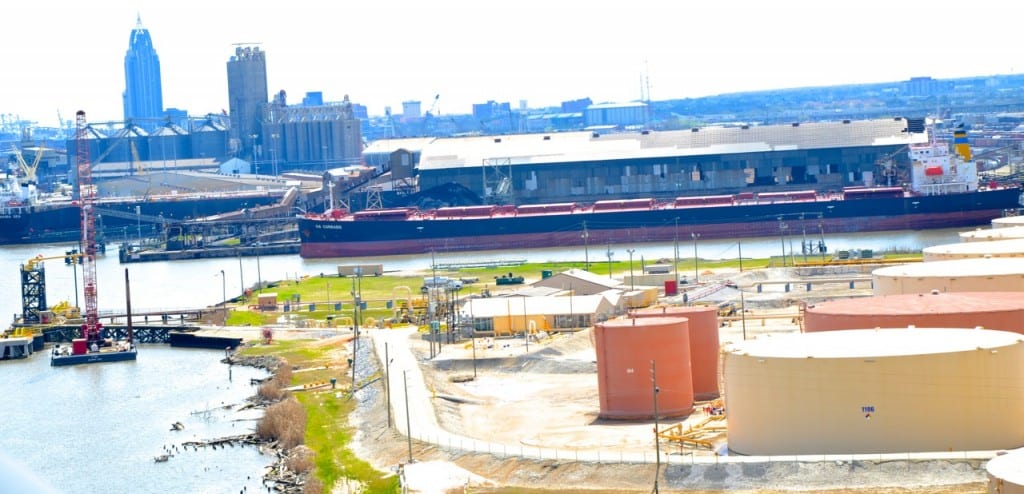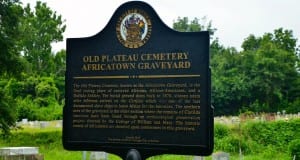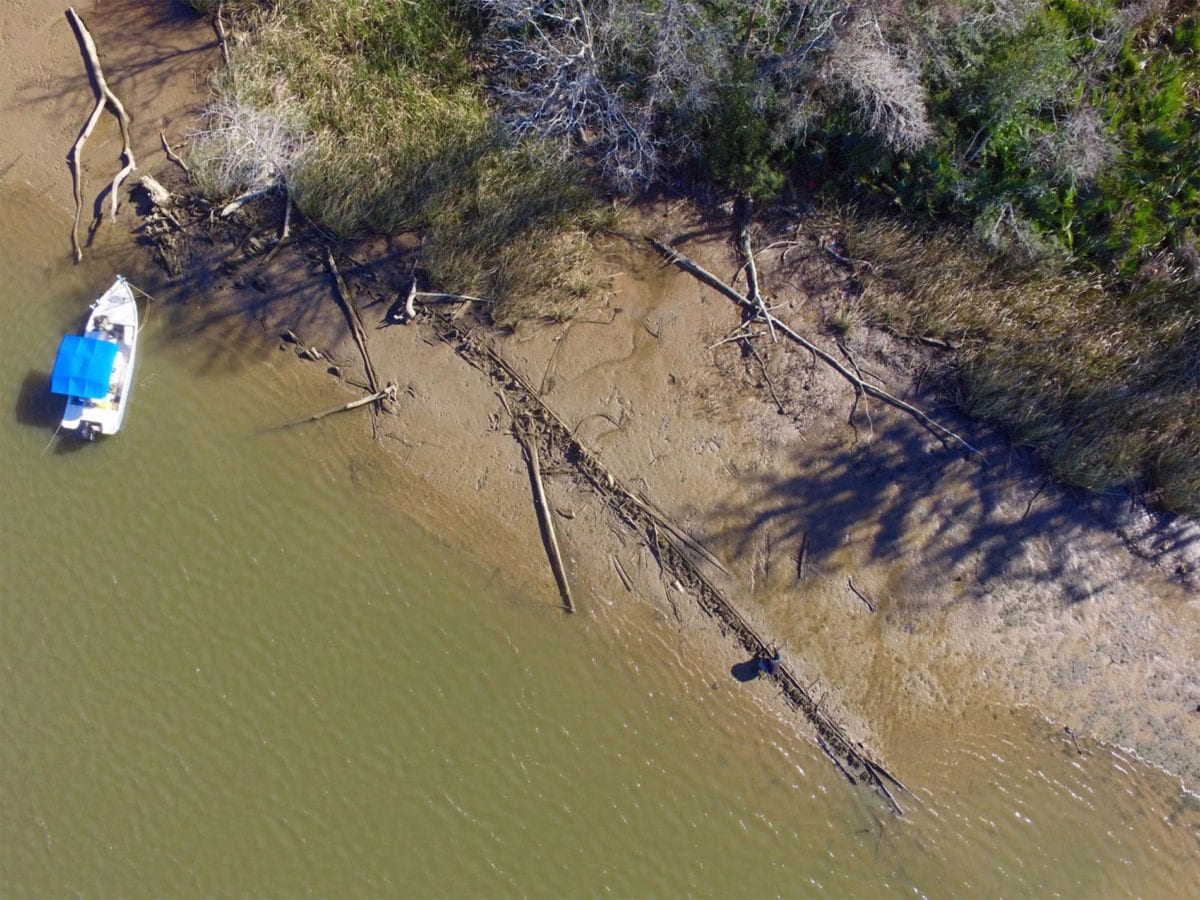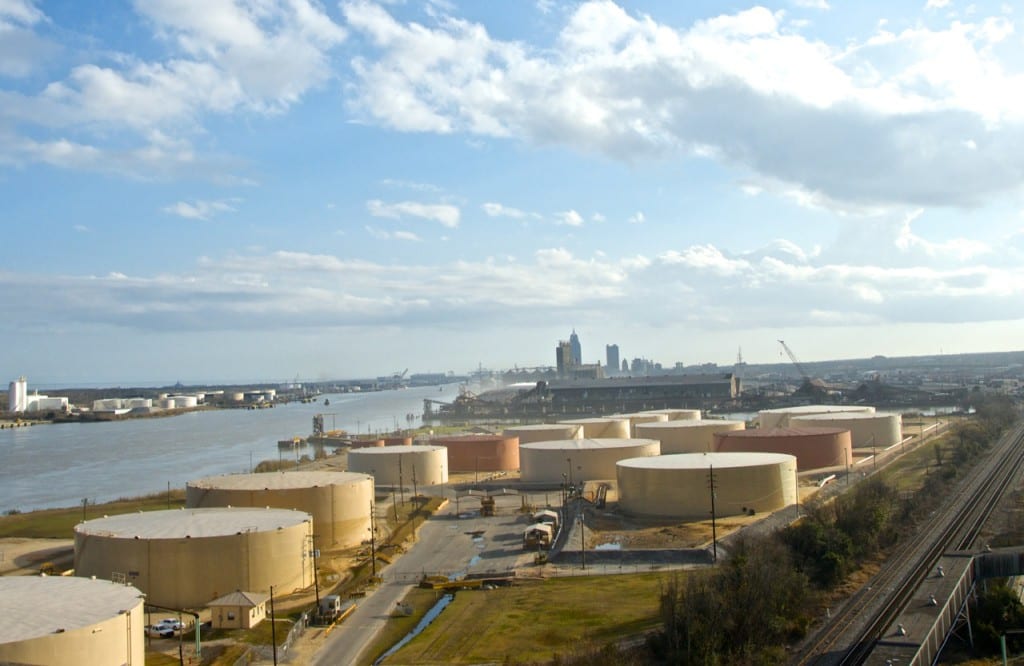Historically Black Town Fights Toxic Waste –

The skyline of Mobile Alabama looking south from Africatown: Glynn Wilson
By D. Amari Jackson –
In the spring of 1860, a year before the Civil War, a wealthy Alabama shipbuilder and plantation owner named Timothy Meaher chose to toy with the escalating tensions between North and South by making a despicable wager. Despite strict laws forbidding the import of enslaved Africans to the United States dating back to 1808, and possible punishment by death, Meaher bet $100,000 that he could send a vessel to the West African kingdom of Dahomey (the modern-day Republic of Benin), purchase 100 Africans for his plantation, and have the captives returned to Mobile without being detected by the federal troops guarding the nearby port.
Not one to lose a bet, Meaher readied his massive and speedy schooner the Clotilda, and hired the crafty sea captain William Foster to complete the diabolical mission. Four months later, after enduring a storm, an attempted mutiny and a near-capture by international sea patrols, Foster had successfully steered the Clotilda undetected through the Gulf of Mexico and back to the Mobile Bay carrying 110 captives, given Meaher had estimated ten percent would perish before reaching him.
However, Foster was intercepted by a boat sent by Meaher to warn that their criminal plot had been discovered and the feds were waiting for the schooner along the Mobile River. So Foster transferred the enslaved Africans to Meaher’s riverboat and, instead of the original plan to sail the Clotilda to Mexico to be cleaned and outfitted with new rigging and papers, Foster and Meaher agreed to burn the vessel in the bay and sink the evidence.
The men would ultimately escape prosecution, yet their captives would not escape enslavement. But five years later, the Civil War would end and, upon gaining their freedom, the Africans of the Clotilda — the last known ship to have carried enslaved Africans into the United States — petitioned both Meaher and the American government to return them to Dahomey.

A sign designates the historic nature of Africatown near Mobile, home to some of the last known slaves illegally shipped to the U.S., where activists say another “environmental injustice” against poor, minority people is underway: Glynn Wilson
Upon being refused, in 1866 the group bought land from its former captors, founded the township of Plateau, built schools and churches, joined with other formerly enslaved Africans, and expanded the community to over five square miles. The community, one of the first towns founded and controlled by Africans in the country, would become Africatown, given the intentional efforts by its members to remain self-sufficient and retain their West African languages, customs, agricultural and spiritual traditions.
Today, this rich history, this still-proud community and these enduring descendants are now being threatened by toxic industrial waste and rising rates of cancer. Last spring, a suit was filed on behalf of 1200 Africatown residents against International Paper, which operated a paper plant for the better part of the 20th century on land owned by the Meaher family. It claims the plant and its related facilities surrounding the town released highly toxic chemicals linked to cancer into the local environment in amounts far exceeding legal EPA limits. It further alleges International Paper, a Memphis-based company that made over $21 billion globally in sales in 2016 alone, violated federal regulations by failing to clean up the site before closing and bulldozing the plant in 2000, leaving chemicals to seep and spread into surrounding areas.
Given the toll on human lives — although no town-specific data exists, longtime residents report they are dying mostly from cancer before age 65 and a recent survey of 150 residents reported 100 of them or their local relatives had cancer — some believe such modern-day corporate malfeasance rivals that ill-intentioned wager made by Meaher more than a century and a half prior.
“Many of these communities were founded by former slaves at the worst time in our history,” said Dr. Robert Bullard, Distinguished Professor of Urban Planning and Environmental Policy at Texas Southern University. The prolific author commonly recognized as “the father of environmental justice” is an Alabama native. He traveled to Africatown to share information on environmental racism and engage local representatives after being inspired by their efforts to save their community.
Despite everything they’ve been through, Bullard said, communities like Africatown have “been able to pull together, become self-sufficient and fend for themselves. And then you get this industrial encroachment by these polluters who see these communities as dumping grounds. That’s the ultimate disrespect. It says your community doesn’t matter, your children don’t matter, your health doesn’t matter, and your lives don’t matter.”
Residents had been questioning the impact of the plant on local health for years.
“I started recognizing that a lot of people were coming down with certain types of diseases, cancer and lung problems years ago,” said Jesse Womack, a lifelong resident of Africatown. He notes how his brother Joe Womack, head of the local environmental justice organization CHESS (Clean Healthy Educated Safe & Sustainable), more recently began organizing around the issue and brought in environmental groups from New Orleans, Atlanta and other places to run soil tests on the local community.
Another longtime resident described the debris from the International Paper plant that used to fill the air daily, when the plant was operational, to “be like snow. Man, it eat up fences, and the top of your house.” Lamenting the devastating toll, he continued, “They killed all of us … our health, man.”
For their part, International Paper has denied all of the allegations in the lawsuit. The case is expected to go to trial later this year. Among other things, the residents are seeking compensation and environmental restoration.
Africatown’s population has declined dramatically from 10,000 in its heyday to about 3,000 as a result of health, increased industrialization and the subsequent decline of local businesses. Its plight is not uncommon for low-income African-American communities in the nation whose residents are regularly saddled with industrial polluters, power plants and waste sites in their midst.
Almost half of nonwhite Americans have been estimated to live within three kilometers of a hazardous waste facility. And a recent report by the NAACP, National Medical Association, and Clean Air Task Force detailed the specific health risks from airborne pollutants caused by fossil fuel development and the elevated risk of cancer due to toxic air exposure impacting Black communities.
“We need regulations, a strong EPA and environmental protections across the board,” Bullard said, lamenting the dangerous anti-environmental policy direction of the Trump administration and lamenting the consequences of failing to have such protections in place for Africatown and other historic black communities across the country.
“It’s telling,” Bullard said. “This community survived the horrors of slavery and Jim Crow segregation but may not survive this modern-day environmental racism.”
—
A version of this article first appeared in the Atlanta Black Star.
Potential Clotilda Discovery Investigated

The Last Ship to Bring Slaves to the U.S. May Have Been Found: National Geographic
The recent potential discovery of the burned shipwreck in the Mobile-Tensaw Delta, Africatown is in the national spotlight and could benefit from the publicity boost.
On Friday, March 2, the Mobile County Training School Alumni Association and Africatown-C.H.E.S.S. will hold a press conference at 10 a.m. at the Robert L. Hope Community Center to announce the arrival of historic preservationists from around the state and nation who will investigate the possible finding of the Clotilda slave ship.
Officials from the African American History Museum in Washington, D.C., the Smithsonian Slave Wreck Project, the National Park Service and the Alabama Historical Commission are expected to be on hand to discuss their probe of the remnants of a 1860s-era ship uncovered by a local journalist. Historical records show the ship’s captain burned and sunk the boat in the waters of the Mobile River delta to hide it from authorities because bringing Africans to the U.S. for slavery was illegal at the time.
In the days after their investigation, the preservation officials will announce their findings to the public during a community meeting in Africatown, which was founded by the Clotilda survivors. The meeting will take place at the Hope Community Center in Plateau on Wednesday, March 7, from 5:30 p.m. to 8:00 p.m.
Researchers and historians expected to arrive as part of the investigative team and to attend the community meeting include:
Paul Gardullo, National Museum of African American History and Culture: Curator. Also Director of the Center for the Study of Global Slavery and active team member of The Slave Wrecks Project;
Steve Lubkemann, The Slave Wrecks Project/George Washington University: Professor;
Mary Elliott, National Museum of African American History and Culture: Museum Specialist;
Liz Smith-Incer, National Park Service: Mississippi Field Office Director for the Rivers, Trails and Conservation Assistance Program;
Dave Conlin, National Park Service: Chief of the Center for Submerged Resources;
David Morgan, National Park Service: Center Director for the Southeast Archaeological Center;
Lisa Jones, Alabama Historical Commission: Executive Director / Alabama State Historical Preservation Office: State Historic Preservation Officer;
Stacye Hathorn, Alabama Historical Commission, part of the Alabama State Historical Preservation Office: State Archaeologist;
Dorothy Walker, Alabama Historical Commission, part of the Alabama State Historical Preservation Office: Black Heritage Council Liaison.
If the ship turns out to be the Clotilda, Africatown and its residents could benefit from the news.

View of downtown Mobile from Africatown: Glynn Wilson














Since the time of the Mayflower Compact, “we,” as a society and government, have embraced vulture capitalism, colonialism, economic injustice, religious and racial prejudice-issues that continue to this day to be wrapped around our flag and taught from our ‘Bibles.’ Maybe one day, as Jesus said, we will allow the ‘truth’ to ‘set us free’?